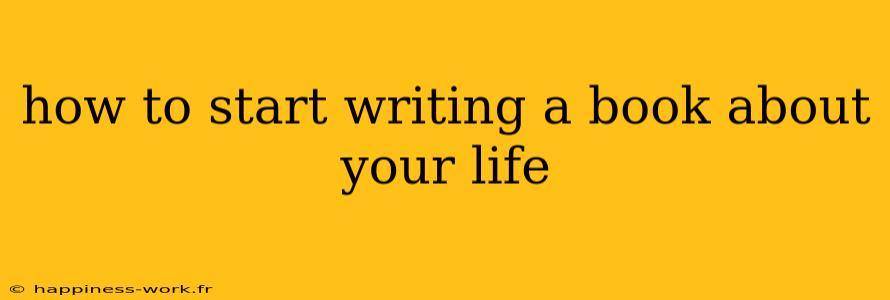Writing a book about your life can be a transformative journey, not only for you as an author but also for your readers. Whether you aim to inspire others, preserve family history, or simply explore your own experiences, chronicling your life story can be immensely rewarding. In this guide, we’ll explore actionable steps to help you begin your writing journey, while ensuring that your work resonates with readers.
Understanding Your Purpose
Why Do You Want to Write Your Life Story?
Before you start putting pen to paper (or fingers to keyboard), it’s crucial to identify your motivation. Ask yourself:
- What message do I want to convey?
- Who is my intended audience?
- Am I writing for myself, for my family, or for a broader audience?
Understanding your purpose will help guide your writing process. For example, if you aim to inspire others, you might focus on themes of resilience and personal growth.
Practical Example
If you’ve overcome significant challenges, such as battling a serious illness or navigating a difficult childhood, your purpose may center around offering hope and encouragement to others facing similar struggles.
Creating a Structure
How Do I Organize My Thoughts?
A clear structure will help you to tell your story more effectively. Consider the following structures:
- Chronological: This is a straightforward approach, outlining events in the order they occurred.
- Thematic: Focus on specific themes or lessons in your life, such as love, loss, or success, and use anecdotes to illustrate those themes.
- Hybrid: Combine elements from both chronological and thematic structures for a more nuanced approach.
Additional Explanation
Using a mind map can be an effective way to brainstorm and organize your thoughts. Start with your life’s major milestones in the center and branch out with sub-events or significant memories connected to those milestones.
Starting Your Writing
Where Should I Begin?
The beginning is often the hardest part. Consider starting with:
- A pivotal moment in your life
- A specific memory that holds significance for you
- Your earliest childhood memory, if it sets the stage for your life’s narrative
Practical Tip
Write freely without worrying about perfection in your first draft. Allow your thoughts to flow, and remember that you can always revise later. The goal is to get your story down on paper.
Finding Your Voice
How Do I Develop My Unique Writing Style?
Your voice is what will engage readers and keep them interested in your story. Here are some tips for finding and developing your voice:
- Write as you speak. Use natural language that reflects who you are.
- Read books by authors whose styles you admire. Pay attention to what draws you to their writing.
- Experiment with different writing techniques until you find one that feels comfortable.
Gathering Feedback
Should I Share My Work?
Sharing your work can provide valuable insights and encouragement. Consider:
- Joining a writing group
- Sharing drafts with trusted friends or family members
- Engaging with beta readers who can provide constructive feedback
Additional Analysis
Receiving feedback can help you see your writing from different perspectives and may highlight areas for improvement you hadn’t considered.
Revising and Editing
How Important Is Revision?
Revision is where the magic happens. Focus on these areas:
- Content: Ensure your story is coherent and engaging.
- Clarity: Remove any ambiguities and ensure your message is clear.
- Style: Make adjustments to your tone and language to enhance readability.
Additional Tip
Consider hiring a professional editor if budget allows. They can provide critical insights and improve the overall quality of your manuscript.
Publishing Your Story
What Are My Options for Publishing?
Once you’ve completed your book, you have several publishing options:
- Traditional Publishing: This involves finding a literary agent and publisher, which can be competitive and lengthy.
- Self-Publishing: A more flexible option that allows you greater creative control and faster publication, but requires you to handle marketing and distribution.
- Hybrid Publishing: A middle ground that combines elements of both traditional and self-publishing.
Conclusion
Writing a book about your life is a deeply personal endeavor that can lead to self-discovery and healing. By identifying your purpose, creating a solid structure, finding your unique voice, and engaging in the revision process, you can craft a compelling narrative that resonates with readers. No matter where you are in your writing journey, remember that every story has value and the potential to inspire.
Final Thoughts
Embarking on this journey will be both challenging and fulfilling. So, grab that notebook or laptop, and start writing your story today. The world is waiting to hear your voice!
Attribution: This article draws on ideas and concepts sourced from WikiHow and has been expanded upon with additional insights and practical examples to provide added value for readers.
